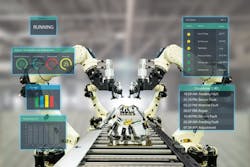Rockwell’s ninth annual “State of Smart Manufacturing Report,” released at the end of March, differs markedly from the eighth annual report. Last year’s executive summary focused on manufacturers embracing technology, the struggle to grow without sacrificing quality and the importance of retaining skilled workers.
This year, the big three topics are the importance of generative AI (GenAI), the rise of cobots, autonomous mobile robots (AMRs), autonomous guided vehicles (AGVs) and wearables as new areas for technology investment and the need for cybersecurity awareness.
I find this year’s report more interesting across the board. The external obstacles rankings, for example:
- Supply chain disruption sank from the No. 2 external obstacle to No. 5.
- Rising energy costs and cybersecurity risks, absent entirely from the external obstacles list last year, came in at No. 2 and No. 3 respectively this year. Not fresh challenges by any means but with new European ESG regulations in place and SEC cybersecurity rules in force, perhaps the manufacturing industry must face both challenges in earnest.
The ninth annual report’s focus on AI grabs the most attention. Does the report necessarily reflect current trends and sales hype? Absolutely. But, are we really just seeing the newest, shiniest talking points or actually in the early stages of a permanent and meaningful change in how manufacturers do business?
You Cannot Deny the Rising Relevance of that AI
Artificial intelligence barely made an appearance in last year’s report but factored significantly into this year’s data.
- 85% of respondents reported investing or planning to invest in AI/ML this year.
- 83% of respondents said they anticipated using generative AI (GenAI) in their operations in 2024 and that GenAI represents the No. 1 new area for technology investment over the next 12 months.
Rockwell to their credit helps break down the way all industries, not just manufacturing, tend to discuss AI as a monolithic technology by offering at the end of the report a glossary of AI-related terms, including the different varieties of AI and what they do. But, the report’s results on use or planned use of AI still introduces confusion.
For example, the report discusses AI use cases that deliver the highest return on investment. Cloud/SaaS took the No. 1 spot. Some details on these use cases would be appreciated. GenAI or causal AI took the No. 2 spot, and while I know what “causal AI” is generally, this is the first time I’ve seen anyone use the term in relation to manufacturing, so what are we talking about here?
Advanced analytics (using AI/ML), the tried-and-true use cases that inarguably provide high return on investment (I would argue that quality control like vision inspection, parts inspection or predictive maintenance systems define AI/ML applications), only came in at No. 6, a confusing response given other AI-related data presented in the report.
Of the planned use cases for AI/ML in 2024, the largest use case cited, by 45% of respondents, was Quality control. Respondents believe quality with be AI’s biggest impact by 2027. And quality is manufacturers’ top focus for smart manufacturing, according to the report. Yet these use cases, arguably best represented by AI/ML, only came in at sixth place for best ROI?
It seems like manufacturers might still be confused about the different types of AI and what they do. Can we truly understand the value of AI to the industry until this confusion clears up and stop talking about “AI” generally and begin talking primarily or only about specific use cases?
Data, Huh, What is it Good for?
Only 44% of respondents felt they used data effectively. This will increasingly become a problem as plant networking expands—84% of respondents say they have adopted or plan to adopt networking hardware on the plant floor, with 82% adopting connected devices and 79% adopting sensors and instruments.
Company size plays into how effectively manufacturers use their data. For manufacturers with more than $30 billion in revenue, 51% say they use data effectively. For manufacturers with less than $500 million in revenue, only 38% report effective use of data.
This also might play into workforce concerns about attracting skilled employees. According to the report, knowledge of smart technology and cybersecurity practices and standards are two of the top skills manufacturers want from new employees. Lack of skill sets to implement and optimize smart technologies hold manufacturers back from adopting the tech.
Manufacturers plan to address the labor shortage and skills gap by increasing automation (42% of respondents) and introducing AI/ML technologies (37%).
ESG is About Dollars and Cents, Not Feel-Good Moments
According to the report, 98% of organizations polled have some sort of ESG policy in place, with 86% having formal policies, up from 78% last year. Rockwell held its first ESG summit last year so their shining a light on this question with their report isn’t surprising.
Industry talk about ESG often focuses on the “S” more than the “E,” couching sustainability as a workforce issue, i.e. addressing next generations’ concerns over how and whether companies act as environmental stewards. The Rockwell report makes it clear that sustainability represents a practical business question.
The report cites Energy Management as the primary reason manufacturers are concerned about sustainability and ESG policies, with Product Quality/Safety and Health and Safety tying for second place. Commitment to ‘Eco-friendly’ Processes ties with Reducing Manufacturing Waste for third place, and Recycling and Carbon Offsetting/Carbon Neutral (the feel-good topics) tie for last.
The report also breaks down manufacturer’s top reasons for pursuing sustainability and ESG. Improve Efficiencies came in at the top slot, with Competitive Differentiation and Address Potential Environmental Issues Before They Arise coming in second and third.
New EU regulations regarding carbon emissions reporting also apply to North American companies that do enough business across the pond, yet Governmental Regulations only came in at No. 5.
“Despite the ranking, government regulations and proposed regulations continue to be top of mind for manufacturers. … Manufacturers can more easily navigate government regulations by staying informed about changing requirements, proactively adopting cleaner technologies and seeking guidance from legal or environmental professionals to ensure ongoing compliance,” Ian Fountain, Director of Digital Transformation at Rockwell tells IndustryWeek.
We see the squishy answers, absent from the previous question about concerns, in response to the question about top reasons to pursue sustainability and ESG, answers like Fosters a Collaborative Environment, Desire to Do Good and Address Social Inequities Suppressing Talent in the Workforce.
Maybe it comes down to how Rockwell phrased the questions but one wonders if the brass tacks, economic questions aren’t how concerned parties ought to address ESG and just leave the kumbaya out of it, to make sure manufacturers take the conversation as seriously as possible.
Cybersecurity Gets Attention Long Overdue
It’s heartening to see cybersecurity taking a more prominent role in this year’s report. As stated earlier, cybersecurity broke into the top five external risks list for the very first time. Laying this squarely at the feet of the new SEC reporting rules probably isn’t fair, but the severity of manufacturing’s problems with ransomware and bad cybersecurity feels well-established at this point so what else has really changed?
The report also shines a light on cybersecurity’s workforce considerations. Cybersecurity ranks as the No. 1 skill employers seek in 2024…not only in IT department candidates?
“Employees at any level who have access to a computer on the network could be tricked into unintentionally granting access to hackers. In fact, a recent report found that insiders play an ‘indirect role’ in more than one-third of cybersecurity incidents with phishing being the most popular form of attack,” Fountain says.
“By fostering a culture of cybersecurity awareness throughout the entire organization, manufacturers can significantly improve their overall security posture. This doesn’t require everyone to become cybersecurity experts, but basic knowledge of cyber threats and best practices can make a big difference,“ Fountain adds.
Cybersecurity software doesn’t alter psychology. Cybersecurity experts constantly stress the importance of cybersecurity awareness and training. Weighing basic cybersecurity awareness among potential hires is probably fair in 2024.
If you’d like to read the other insights provides in this year’s State of Smart Manufacturing report, you can download the full report from Rockwell Automation.
About the Author
Dennis Scimeca
Dennis Scimeca is a veteran technology journalist with particular experience in vision system technology, machine learning/artificial intelligence, and augmented/mixed/virtual reality (XR), with bylines in consumer, developer, and B2B outlets.
At IndustryWeek, he covers the competitive advantages gained by manufacturers that deploy proven technologies. If you would like to share your story with IndustryWeek, please contact Dennis at [email protected].




